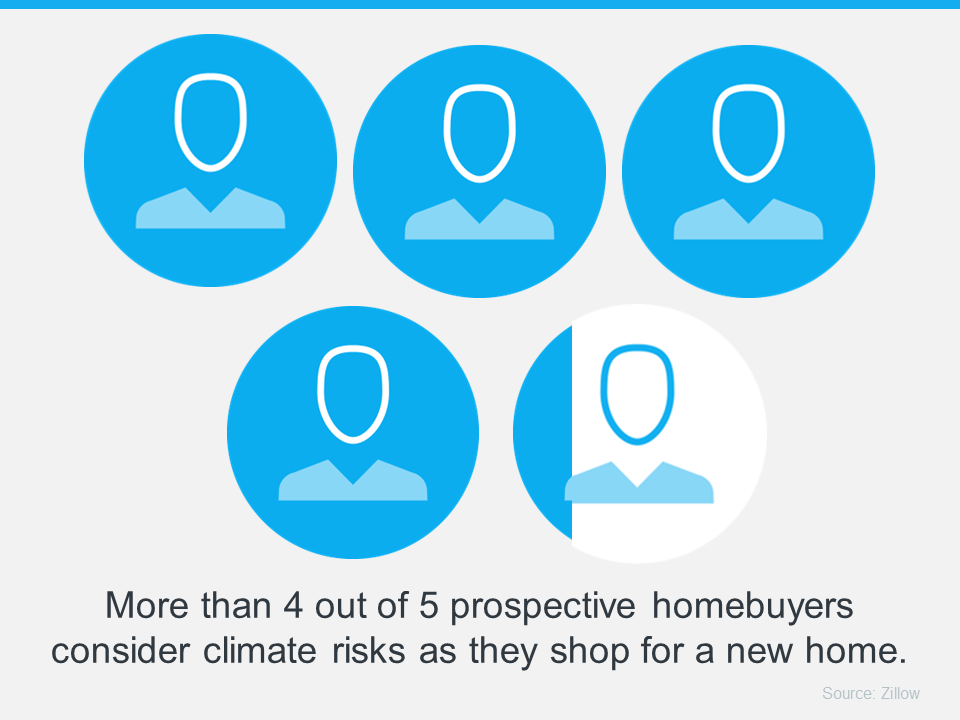Worried about Weather and Climate Risks?
The increasing effects of more damaging weather are leading to new obstacles in residential real estate. As a recent article from CoreLogic explains: “As the specter of climate change looms large, the world is bracing for unprecedented challenges. In the world of real estate, one of these challenges will be the effects on property portfolios, homeowners and communities.”
That may be why, according to Zillow, more and more Americans now consider how weather risks can impact their homeownership plans (see below):
This study goes on to explain that climate risks affect where many people look for a home. That’s because homebuyers are interested in finding out if the house they want will be exposed to things like floods, extreme heat, and wildfires.
On Cape Cod, concerns center around living in a flood zone and the cost of insurance; topical storms and beach erosion, and nitrogen sensitive areas.
The Mortgage Reports provides these tips for buying your next home in a weather sensitive area:
Evaluate climate risks: Before buying a home, it’s important to check to see if it’s in a flood-prone area using the FEMA website; review the seller’s property disclosure for any past damage, and get an inspection for issues like cracks and mold to make sure it’s a safe investment.
Consider future preventative maintenance costs: For areas that get tropical storms, you may need to purchase hurricane shutters and sandbags to protect the home. If you’re buying in wildfire-prone areas, you may want to clear plants five feet from the house, consider rooftop sprinklers, or possibly buy gutter guards to prevent fire hazards. Factor these future expenses in when touring homes that may need them.
Take steps to avoid losing your assets: Getting the right insurance for a home in a high-risk climate area is crucial. You should shop around and talk to multiple insurance agents to compare prices and options before deciding to bid on a home.
This is not to discourage anyone from buying a home on Cape. But don’t assume “it can’t happen here” when it comes to the weather. We’ve recently seen too many incidents in various parts of the country where unexpected severe weather has caused damage and even taken lives.
(The picture above shows what’s left of the historic Sandwich Boardwalk following a winter storm. It is in the process of being replaced by one made with stronger materials. It was also re built in 1992 following Hurricane Bob, but used the same wooden materials.)
You can depend on real estate professionals like us to provide the best advice. We have lived on Cape for 28 years and are familiar with areas that could be problematic, if the appropriate precautions aren’t taken. We’re also up to speed with current requirements regarding nitrogen sensitive areas. (Something that agents who aren’t familiar with the Cape may not know about.).
Your home is a big investment, and if anything can impact that, you should know about it.
Want to talk it out? We’re here to listen. Let’s connect at 508-360-5664 or [email protected] to start the conversation…
Mari and Hank

Categories
- All Blogs
- Cape Cod
- climate change
- Condominiums
- Down Payment
- Economy
- Food
- Home buyers
- Home buying tips
- Home Sellers
- Homeowners
- Housing Supply
- kcm crew
- Make Your Move with Mari
- Mari Sennott Plus
- Mortgage Interest Rates
- National Association of Realtors
- Ownership Goals
- Real Estate
- Realtor.com
- Sandwich, Mass





